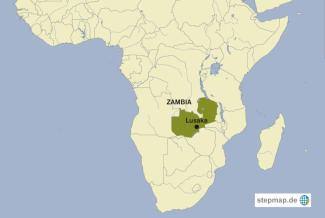Pandemic
Fear, anxiety and panic
 stepmap.de
stepmap.de
Early on, the World Health Organization (WHO) listed Zambia as one of the 13 African countries at high risk of importing the deadly Coronavirus. On 18 March, Zambia confirmed its first cases, involving a couple who had travelled to France. By 6 April, the number had risen to 39, and one patient had died. According to the government, Lusaka, the capital city, is the epicentre.
Fear, anxiety and panic are spreading among Zambian citizens. The government put in place some interventions to help contain the virus. An emergency fund was set up to provide resources for surveillance, response and preparedness. Citizens can reach a call centre toll-free by phone. Isolation centres have been established at district level across the country. State agencies are procuring disinfectants and personal protective equipment including gloves, face masks et cetera. Health-care workers and government officials, including immigration and customs officers, get special training. However, Zambia is a least-developed country with weak capacities, so bottlenecks and implementation deficits are to be expected.
In a national address in late March, President Edgar Lungu suspended all international flights – except those landing and departing from the Kenneth Kaunda International Airport in the capital Lusaka. He ordered gyms, bars, casinos and night clubs to be closed. Restaurants may only sell takeaway food. Social gatherings have been restricted to 50 people. Schools have been closed indefinitely.
People are afraid of two things: falling sick and suffering hunger. The economy is slowing down and especially people who depend on daily wages are dropping into desperate deprivation. Adding to the problems, misunderstandings, misinformation and myths concerning Covid-19 affect many people. Where I live, some people think that drinking strong alcoholic beverages prevent infections. Others believe that the novel coronavirus was created as a biological weapon for World War III. It would be helpful if people understood the science of infections mostly being caused by droplets infected people produce when they cough, sneeze or speak.
Coronavirus has the potential to become a big problem in Zambia. The economy is weak and so is the health-care system. Poor people will not be able to observe the lockdown. Government resources for cushioning impacts on disadvantaged communities are limited. Public transportation is still operational in spite of warnings that it may spread infections. It is the main means of moving about. Water and sanitation are challenges even in the best times – and now it seems we are heading for the worst.
Frank Masanta Jr. is an education activist in Zambia.
frankmasanta.jr@gmail.com

